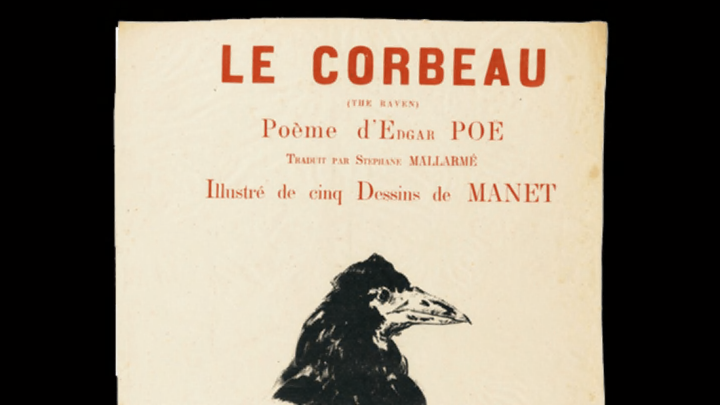When October’s chill grips the air, we reach for those familiar spooky stories we crave this time of year. Since today is the anniversary of Poe's passing, it’s our chance to toast America’s first great mystery writer and retrace his footsteps into the macabre.
Edgar Allan Poe died on October 7, 1849, just four years after becoming an overnight literary sensation for his haunting poem "The Raven." It’s a now familiar tale of a forlorn bookworm tormented by lost love, questions of his own insanity, and a stoic raven who repeats the phrase “nevermore.” In addition to captivating American readers, the poem made waves abroad in France, where translations of the "The Raven" gave Poe cult status among admiring poets in the years after his death.
Poe’s reputation languished in the United States following his death. An obituary and subsequent memoir by Rufus Wilmot Griswold, Poe’s literary rival, cast Poe as a drunkard and a wasted talent. In France, however, drunkenness and debauchery were apparently more acceptable behavior for poets. Amid Belle Époque Paris’ absinthe-soaked cafes and literary salons, a small group of innovative writers known as the Parnassians took to Poe’s fascination with the less savory side of life. One particular Parnassian, the poet Stéphane Mallarmé, positively swooned over Poe’s spine-tingling verse. A symbolist, Mallarmé obsessed over evocative language. And like Poe, he had a penchant for the supernatural. In 1875, he decided to translate Poe's poem into French—and, in the process, draped an even more chilling cloak over Poe’s already creepy masterpiece.
The opening lines of "Le Corbeau" provide a stylistic sampling of how Mallarmé used French to make "The Raven" even spookier. The familiar “midnight dreary” we associate with Poe’s version becomes the more funereal and morbid “minuit lugubre” in French. The nervous narrator’s book collection, described by Poe as “quaint and curious,” is transformed by Mallarmé into “curieux et bizarre,” infusing the lines with an even stranger, more unsettling tone.
Once upon a midnight dreary, while I pondered, weak and weary, Over many a quaint and curious volume of forgotten lore— While I nodded, nearly napping, suddenly there came a tapping, As of some one gently rapping—rapping at my chamber door. "'Tis some visitor," I muttered, "tapping at my chamber door— Only this and nothing more." Une fois, par un minuit lugubre, tandis que je m'appesantissais, faible et fatigué, sur maintcurieux et bizarre volume de savoir oublié— tandis que je dodelinais la tête, somnolant presque: soudain se fit un heurt, comme de quelqu'un frappant doucement, frappant à la porte de ma chambre—cela seul et rien de plus.
And the poet didn't just use language in his translation: Mallarmé’s 1875 edition of "Le Corbeau" is made even more enchanting by the illustrations adorning the text. The shadowy black smudgings belong to none other than French painter Édouard Manet. Mallarmé and Manet had been friends for years (according to the Musée d'Orsay, they would meet every day to discuss painting, literature, and cats), and Mallarmé would write an impassioned article that would proclaim Manet’s influence “sways all the painters of the day.”
Mallarmé called the illustrations “so intense and at the same time so modern ... completely imaginative in their reality.” The push broom mustache Manet fondly gave to the poem’s narrator bears an unmistakable resemblance to Mallarmé himself.

Wikimedia Commons // Public Domain
Shortly after publishing "Le Corbeau," Mallarmé penned a fitting homage to Poe, in commemoration of a new monument set to adorn Poe’s burial place. Translations of "Le Tombeau d’Edgar Poe" vary wildly, but in any version it depicts Poe as an ideal poet by Mallarmé’s standards: genius yet misunderstood. “The Poet with a naked sword provokes his century,” the poem reads, “appalled to not have known death triumphed in that strange voice!”
